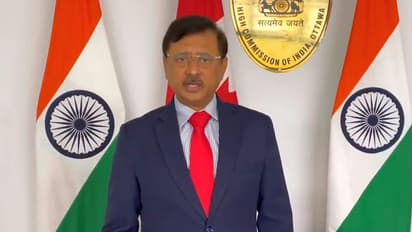'Trudeau destroyed Canada-India ties, Khalistani terrorists are their deep assets': Envoy Sanjay Verma (WATCH)

Synopsis
Outgoing Indian High Commissioner to Canada, Sanjay Verma, has made strong accusations against Canadian PM Justin Trudeau, blaming him for damaging India-Canada relations over allegations linked to the murder of Khalistani terrorist Hardeep Singh Nijjar.
Outgoing Indian High Commissioner to Canada, Sanjay Verma, has made strong accusations against Canadian Prime Minister Justin Trudeau, blaming him for damaging India-Canada relations over allegations linked to the murder of Khalistani terrorist Hardeep Singh Nijjar. Describing the charges against him as “politically motivated,” Verma accused Trudeau of destroying the political relationship between the two countries based on intelligence rather than solid evidence.
Verma, speaking to Canada's CTV News before his departure to India, stated that Ottawa’s actions had been driven by intelligence reports, which he claimed were being used to fuel the Khalistani extremist agenda. "He (Justin Trudeau) himself admitted there was no evidence. On the basis of intelligence, if you want to destroy a relationship, be my guest. And that’s what he did," Verma said in the interview, accusing Canada of not following the standard protocol of sharing evidence before making public accusations.
Watch Sanjay Verma's full interview here:
Canada recently expelled Verma along with five other Indian diplomats for their alleged involvement in criminal activities. India, in response, recalled its diplomats, asserting that the move was made independently and not as a result of Canadian pressure. In a retaliatory step, India also expelled six Canadian diplomats.
Verma’s expulsion follows Canada's claims that India was involved in Nijjar’s assassination, which took place earlier this year. Verma firmly denied these allegations, stating, “Nothing at all. No evidence was presented. It’s politically motivated.” He emphasized that the usual diplomatic practice of sharing evidence had been ignored by the Canadian government, instead choosing to publicly air unproven allegations in Parliament.
In his interview, Verma criticized Canada’s reliance on intelligence, claiming that it was based on hearsay and that the individuals involved in providing this information were pro-Khalistani extremists and anti-India elements. “I know, for sure, that they go from one person to the other, asking them about the hearsay. Most of them are those who are pro-Khalistan elements, anti-India elements,” he said.
Verma further stated that the Justin Trudeau government encouraged Khalistani extremists "all the time". "This is my allegation, I also know that some of these Khalistani extremists and terrorists are deep assets of CSIS, again I'm not giving any evidence," he said.
He also accused the Canadian government of failing to address India’s long-standing requests for the extradition of 26 individuals involved in terrorist activities, many of whom have ties to the Khalistani movement. “The day he did that, since then, he has made sure that bilateral relations with India only go downwards, spiraling down,” Verma remarked, highlighting the deteriorating diplomatic relationship between the two nations.
Verma revealed that Canadian authorities had sought to interrogate him, asking India to waive his diplomatic immunity. He stressed that any such interrogation should be based on concrete evidence. “If I am going to be interrogated, I need to see the evidence and know what am I being interrogated for,” Verma stated, suggesting that the Canadian government had failed to follow appropriate diplomatic procedures.
Additionally, Verma explained that Canadian law enforcement officials had attempted to visit India but did not follow proper visa protocols. He mentioned that the officials submitted their visa application only on the day they were due to travel, without providing an agenda for their visit. This, according to Verma, delayed the process and raised questions about Canada’s handling of the situation.
Verma strongly refuted any claims that India had been involved in extra-judicial killings, calling the accusations baseless. “India has never done it but some G7 countries have,” he said, hinting at the double standards in how these allegations are handled without naming specific countries. When asked whether the Indian government had ever targeted individuals with the goal of their death, Verma categorically denied such actions, emphasizing that as the world’s largest democracy, India does not engage in such practices.
"I as High Commissioner of India had never done anything of that kind," he further emphasized.
Verma also condemned the murder of Hardeep Singh Nijjar, stating, “Any murder is wrong and bad. I do condemn. Let’s get to the bottom of the issue,” while dismissing allegations that Indian diplomats had been gathering intelligence to target Canadian nationals. He acknowledged that as High Commissioner, he had an interest in monitoring pro-Khalistani activities in Canada, stating, “Do we want to know what pro-Khalistani elements in Canada are doing? Yes, we do. That’s my national interest.”
Sanjay Verma’s departure from Canada marks another low point in the already strained India-Canada relations. As both nations continue to expel diplomats and trade accusations, the future of their diplomatic ties remains uncertain. Verma’s statements suggest that India remains firm in its stance, denying involvement in Nijjar’s murder and accusing Canada of mishandling a critical diplomatic issue. Meanwhile, Prime Minister Trudeau’s accusations and the lack of shared evidence continue to fuel tensions between the two nations.
Stay updated with the Breaking News Today and Latest News from across India and around the world. Get real-time updates, in-depth analysis, and comprehensive coverage of India News, World News, Indian Defence News, Kerala News, and Karnataka News. From politics to current affairs, follow every major story as it unfolds. Get real-time updates from IMD on major cities weather forecasts, including Rain alerts, Cyclone warnings, and temperature trends. Download the Asianet News Official App from the Android Play Store and iPhone App Store for accurate and timely news updates anytime, anywhere.